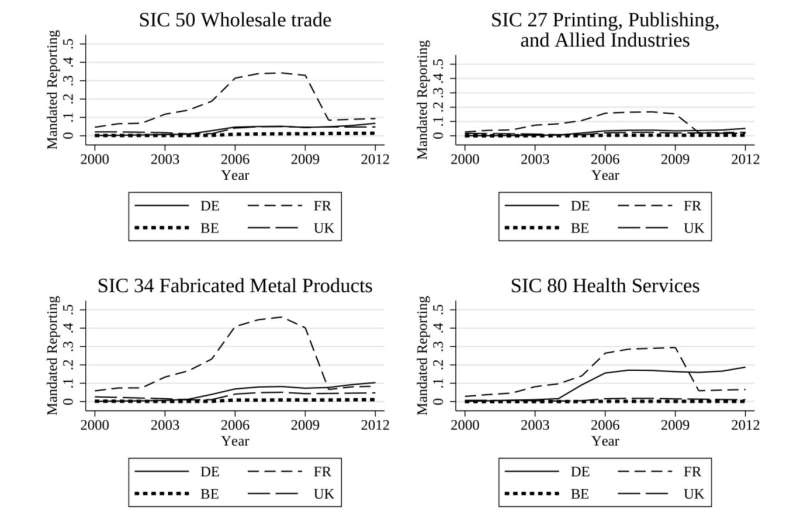This article has been reviewed according to Science X's editorial process and policies. Editors have highlighted the following attributes while ensuring the content's credibility:
fact-checked
peer-reviewed publication
trusted source
proofread
Mandatory EU financial disclosure increases frequency and quality of M&A deals, says study

Forcing private firms to disclose their financial statements leads to more mergers and acquisitions (M&As) and better deals, according to a new paper published by a researcher from Bayes Business School (formerly Cass).
The paper, which has been published in the Review of Financial Studies, found that financial disclosure increases M&A activity by reducing information friction in the market for corporate control.
Following the implementation of the 2003 European Commission (EC) directive on financial reporting, the study shows the positive spillovers associated with this regulation, counteracting the common view that M&A deals are value-destroying in nature.
Assessing M&As
M&As are large and risky investment decisions for firms. Particularly when the potential target is a private company, the scarcity of available information is bound to be a hurdle for a potential acquirer.
To explore how the EU directive affected M&A deals, the researchers compiled detailed data from Zephyr, a comprehensive database on mergers and acquisitions. This approach yielded 40,321 deals from 12 countries completed between 2001 and 2012, which they complemented with target's financials following the completion of the deal.
Key findings from the research show:
- M&As of private targets increased with the enactment of the disclosure regulation. Consistent with the view that more extensive disclosure of financial information reduces the information friction faced by the potential acquirers, they also discovered that mandatory reporting intensity is positively correlated with M&A activity, even when accounting for different ways to measure M&A activity.
- Using data on the targets after an acquisition, the researchers found that more mandated disclosures in the industry lead to higher growth rates (measured by total assets) in the target after the acquisition, but not necessarily better performance. Conversely, an increase in target-specific disclosure requirements is associated with greater growth and improved performance post-deal. This suggests that firm-specific information is the key driver of synergistic deals, while industry-specific information may not necessarily help achieve the best match between acquirer and target.
Effects of mandatory disclosure
Co-author Dr. Francisco Urzúa, Reader in Finance at Bayes Business School (formerly Cass), said,
"Our study shows that more deals take place following the implementation of mandatory reporting in the EU, but not only that, targets that are disclosing thanks to this regulation improve their performance after the acquisition. That is, there are more and better deals taking place thanks to it."
"Our empirical results support the argument that mandatory disclosure of financial information facilitates the identification of new deal opportunities, ultimately leading to more M&A activity and better-performing acquisitions."
"In many countries around the world, including Canada and the United States, private firms face essentially no financial reporting requirements. An important normative question is whether some level of mandatory disclosure—maybe limited to the largest private firms—should be required. After all, private firms in the US employ about two-thirds of total US employees. The findings in this paper point to a clear benefit from introducing some mandatory disclosure requirements for the largest private firms."
More information: Marcelo Ortiz et al, Mandatory Financial Disclosure and M&A Activity, The Review of Financial Studies (2023). DOI: 10.1093/rfs/hhad052
Journal information: Review of Financial Studies
Provided by City University London




















